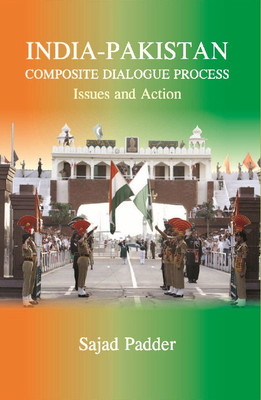India-Pakistan Composite Dialogue Process : Issues and Action(English, Hardcover, Sajad Padder)
Quick Overview
Product Price Comparison
Original Title: India-Pakistan Composite Dialogue Process : Issues and Action, Description: About The Book:- India and Pakistan started the Composite Dialogue Process (CDP) in 1997 when at Male, the capital of the Maldives, the then Indian Prime Minister Inder Kumar Gujral and his Pakistani counterpart Nawaz Sharif proposed the idea of a structured dialogue. Initially the dialogue process became the casualty of the 1999 Kargil war and the subsequent attack on the Indian Parliament in 2001.However, since April 2003 it has progressed steadily till the November 26, 2008 Mumbai terror attacks when the dialogue process was suspended for a long time. This book dwells upon the history of the peace process since its inception in 1997 and examines the progress made in the eight baskets of issues namely, Peace and Security including Confidence Building Measures (CBMs); Jammu and Kashmir (J&K); Siachen; Wullar Barrage/Tulbul Navigation Project; Sir Creek; Economic and Commercial Cooperation; Terrorism and Drug Trafficking; and, Promotion of Friendly Exchanges in Various Fields. Amongst the major achievements of Composite Dialogue can be cited a number of Confidence Building Measures related to peace and security; enhanced people to people contacts through bus and train services; continuation of ceasefire along the LoC since 2003; setting up of the Judicial Committee to look into the humanitarian issue of civilian prisoners/fishermen held in each other's jails and substantial growth on the trade front.About The Author:- Sajad Padder was born and brought up in the Valley of Kashmir. He completed his Masters &M.Philin Political Science with first division from the Department of Political Science, University of Kashmir, Srinagar. He is currently a PhD fellow in the same institute. The young academic's research is focused on ŌĆ£India-Pakistan RelationsŌĆØ. He has many international publications to his credit. He has qualified the University Grants Commission-National Eligibility Test in the year 2011. A recipient of Doctoral Fellowship awarded by the Indian Council of Social Science Research, New Delhi, he is presently teaching at the UNESCO-Madanjeet Singh Institute of Kashmir Studies, University of Kashmir, Srinagar.Content: Preface 9 List of Abbreviations 11 Chapter-1 Brief Survey of Indo-Pak Relations in the Context of War and Peace Treaties 15 Birth of Pakistan 15 The Emergence of Kashmir as a Problem 16 Kashmir in the UN 20 Karachi AgreementŌĆö1949 21 Delhi AgreementŌĆö1952 22 Removal of Sheikh AbdullahŌĆö1953 24 Indus Water TreatyŌĆö1960 25 Sino-Indian War of 1962 and its Impact on Indo-Pak Relations 27 The Kutch ConflictŌĆö1965 28 Second Kashmir WarŌĆö1965 28 Tashkent DeclarationŌĆö1966 30 Significance for Politics within Jammu and Kashmir 31 Indo-Pak WarŌĆö1971 31 Simla AgreementŌĆö1972 32 Significance for Politics within Jammu and Kashmir 34 The Indian Nuclear ExplosionŌĆö1974 35 Kashmir AccordŌĆö1975 35 Siachen ClashesŌĆö1984 37 Exercise BrasstacksŌĆö1986 38 Insurgency in KashmirŌĆö1989 38 Male SpiritŌĆö1997 39 Nuclear Explosions of MayŌĆö1998 40 Bus Diplomacy and the Lahore Declaration 41 Kargil AffairŌĆö1999 42 Political-Strategic Motives 42 Military/Proxy War-Related Motives 43 Agra SummitŌĆö2001 43 Notes 45 Chapter-2 Issues and Components in the Composite Dialogue Process 51 Peace and Security including CBMs 53 Jammu and Kashmir 55 Siachen 59 Tulbul Navigation Project/ Wullar Barrage 62 Sir Creek 64 Terrorism and Drug Trafficking 66 Economic and Commercial Cooperation 68 Promotion of Friendly Exchanges in Various Fields 70 Chapter-3 Mapping the Progress of the Composite Dialogue Process 77 Peace and Security including CBMs 77 Military CBMs 78 Non-Military CBMs 79 Jammu and Kashmir 81 Joint Statement at Islamabad 81 Thinking Kashmir: From Four-steps to Autonomy and Self-governance 83 Internal Dialogue Process 85 Ground Reality at Present 87 Siachen 88 Wullar Barrage/Tulbul Navigation Project 91 Sir Creek 92 Terrorism and Drug Trafficking 94 Joint Anti-terrorism Mechanism (Havana Declaration) 95 Economic and Commercial Cooperation 98 Cross-LoC Trade 103 IranŌĆōPakistanŌĆōIndia Gas Pipeline 106 Promotion of Friendly Exchanges in Various Fields 106 Meeting Points along the LoC 107 Transport Links 107 Chapter-4 Challenges to the Composite Dialogue Process 117 Factors Affecting the Peace Process 118 The First Entrenched Factor: Leadership 122 The Second Entrenched Factor: Public Opinion 124 The Third Entrenched Factor: The Trust Deficit 129 The Fourth Entrenched Factor: Terrorism 130 Chapter-5 Conclusion 139 Appendices 145 Bibliography 159 Index 173The Title 'India-Pakistan Composite Dialogue Process : Issues and Action written by Sajad Padder' was published in the year 2015. The ISBN number 9789351280866 is assigned to the Hardcover version of this title. This book has total of pp. 178 (Pages). The publisher of this title is Kalpaz Publications. This Book is in English.


